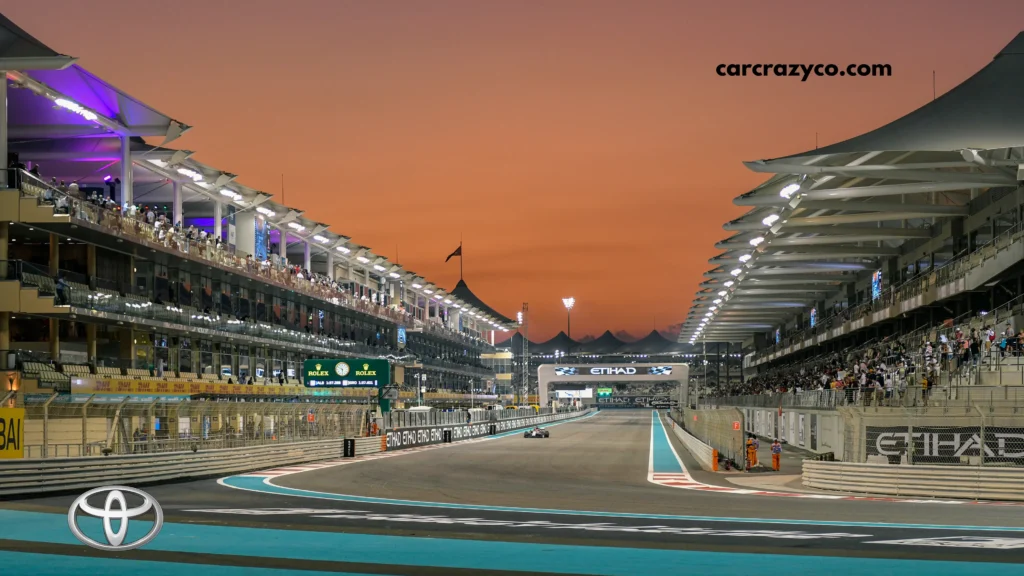When we think of Toyota, we often think of reliability, hybrids, and long-lasting family cars — not the roaring speed and high risks of Formula 1. But surprisingly, Toyota once took a bold leap into the world’s fastest racing league, hoping to dominate both tracks and headlines. It’s a part of the brand’s history many fans never knew or have long forgotten.
Toyota’s time in F1 wasn’t just a racing experiment — it was a test of engineering ambition, global identity, and the limits of a brand known for dependability, not daring speed. Competing against giants like Ferrari and McLaren, Toyota brought a different energy to the paddock, one backed by corporate power and a clean, efficient mindset.
So why did Toyota join F1, and what went wrong — or right? This blog dives deep into Toyota’s F1 journey, from its high-profile entry to its sudden exit. Whether you’re a racing fan or just curious about Toyota’s lesser-known adventures, this is a ride worth taking.
Contents
Was Toyota in F1? The Full Story in 5 Key Parts
1. The Ambitious Entry into Formula 1
Toyota entered Formula 1 officially in 2002, under the team name Panasonic Toyota Racing. It was one of the few teams to build both its chassis and engine entirely in-house, reflecting full corporate commitment.
The team was based in Cologne, Germany, not Japan, showing its desire to stay close to the European racing hub. With massive funding and world-class facilities, Toyota was expected to become an instant contender.
But F1 success requires more than money — it demands racing instinct, bold strategy, and sharp teamwork, areas where Toyota had to catch up quickly.
2. The Struggle to Deliver Results
Toyota’s first race season in 2002 was underwhelming, with only a few points finishes and no podiums. Despite hiring experienced drivers and engineers, the team struggled to compete with established F1 giants.
Its best season came in 2005, finishing fourth in the constructors’ championship, with a few podium finishes and strong qualifying performances. But wins still remained out of reach.
Year after year, Toyota spent hundreds of millions but couldn’t secure a single Grand Prix victory, leading to growing internal pressure and media scrutiny.

3. Innovation and Unique Strengths
Despite its lack of wins, Toyota was known for its technical innovation and professionalism. The Cologne facility became one of the most advanced in F1, offering cutting-edge tools for car development and testing.
The team was praised for its clean corporate image, efficient organization, and commitment to sportsmanship. Toyota’s in-house engine program produced reliable and powerful engines, used by other teams like Williams.
Their cars were often fast in qualifying, but lacked consistency and race pace to convert those performances into wins.
4. Financial Strain and Global Recession
By 2008–2009, Toyota was spending over $300 million per year on its F1 program — one of the highest budgets on the grid. However, global events changed everything.
The 2008 financial crisis hit the auto industry hard, forcing many companies to cut costs and rethink non-essential ventures. Toyota, facing declining sales, had to reprioritize its spending.
Despite some progress on track, the economic pressure and lack of wins led to the decision to exit Formula 1 in 2009, after eight seasons.
5. Toyota’s Lasting Legacy in Motorsports
Although Toyota never won in Formula 1, its impact is still felt in the racing world. Its facilities continue to support WEC (World Endurance Championship) success, including multiple Le Mans victories.
The F1 project helped Toyota build engineering talent, which later shaped its dominance in hybrid racing technology. It also inspired a generation of Japanese drivers and engineers to dream big.
In hindsight, Toyota’s F1 stint showed that even the most successful carmakers face new challenges on unfamiliar ground — but also that failure can fuel future greatness.

Conclusion: Toyota in F1 – A Bold Gamble with Lasting Lessons
Toyota’s journey through Formula 1 may not have ended with trophies, but it showcased a willingness to compete at the highest level. It wasn’t just about racing — it was about learning, adapting, and growing under pressure.
The experience exposed gaps in Toyota’s racing DNA but also revealed its engineering strengths, which live on in other motorsports. From endurance races to hybrid tech, F1 gave Toyota new tools and insight to become even better.
So yes, Toyota was in F1 — and while it didn’t dominate, it dared to try. That bold chapter may be over, but its impact is still driving Toyota forward.
FAQs
1. Did Toyota ever race in Formula 1?
Yes, Toyota competed in F1 from 2002 to 2009 as Panasonic Toyota Racing.
2. Did Toyota ever win a Formula 1 race?
No, despite strong efforts, Toyota never won a Grand Prix during its F1 participation.
3. Why did Toyota leave Formula 1?
Toyota exited in 2009 due to financial losses, the global recession, and lack of race wins.
4. Where was Toyota’s F1 team based?
The team was headquartered in Cologne, Germany, not Japan, for proximity to the European F1 circuit.
5. What was Toyota’s best F1 season?
Toyota’s best season was in 2005, when they finished fourth in the Constructors’ Championship.
6. Is Toyota planning to return to F1?
As of now, Toyota has no confirmed plans to return to F1 but remains active in other major racing series like WEC.








